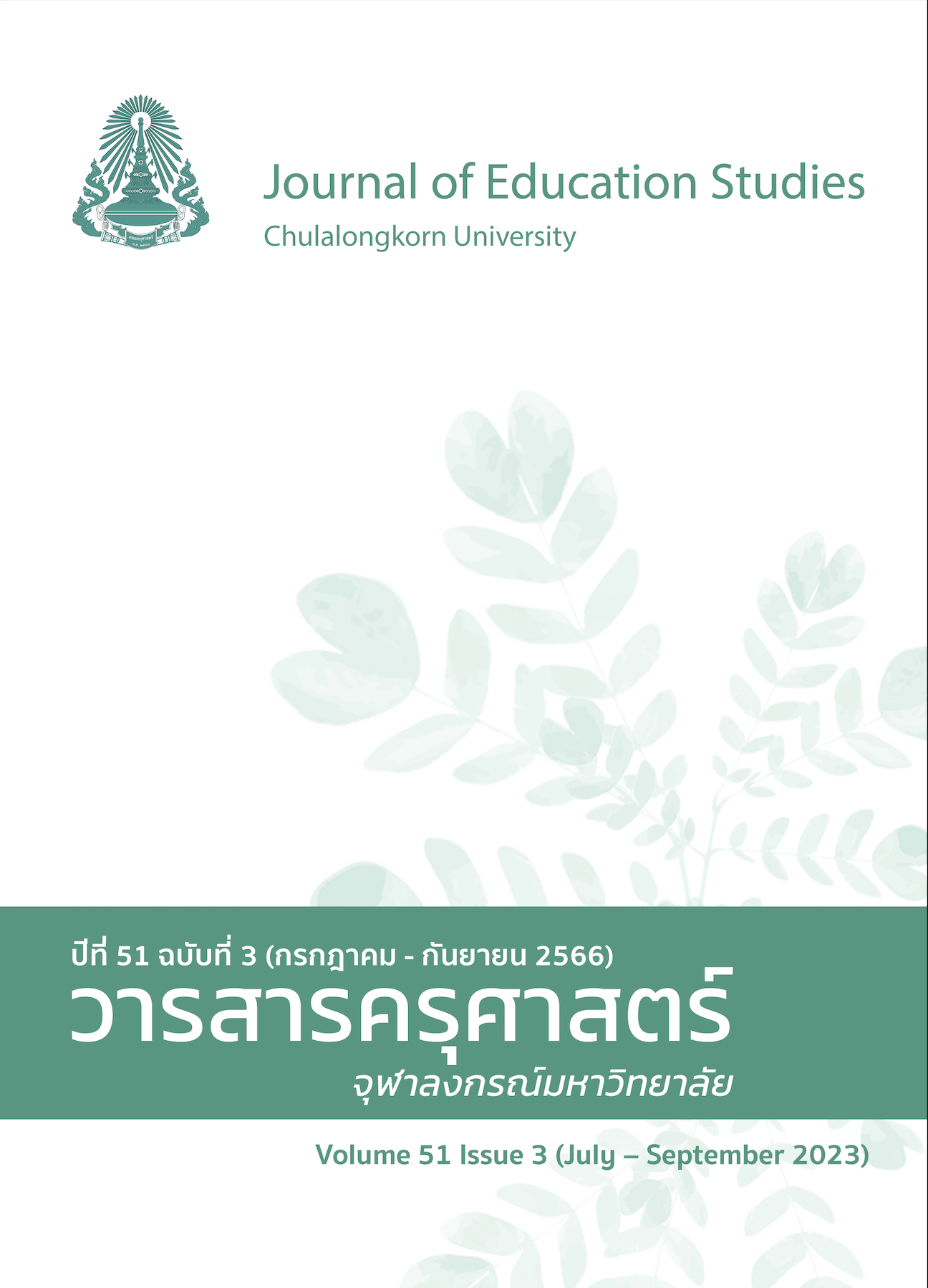Effects of Game-Based Learning on Student Engagement and Academic Achievement of Metabolism of Biomolecules in the First Year Nursing Students
DOI:
https://doi.org/10.14456/educu.2023.20Keywords:
Academic Achievement, Metabolism of Biomolecules, Nursing StudentsAbstract
Although the study of the metabolism of biomolecules is difficult, complicated and many students failed the exam, it is fundamental knowledge for first-year nursing students to understand and apply professionally in the future. This research used game-based learning to increase student engagement and learning outcomes for 150 first-year nursing students in Phrapokklao Nursing College, Chanthaburi. Several platforms and games were used to teach four chapters, including carbohydrate, lipid, protein and nucleic metabolism, with each chapter receiving 2 hours of classroom instruction in addition to self-study review. The research instruments consisted of measures of student engagement, pre-test and post-test assessments of each chapter, and a final exam. The results showed that: 1) game-based learning significantly increased student engagement (paired t-test; t = -7.062; p =0.00), 2) significant differences existed between pre- and post-test scores for each metabolism chapter when analyzed using Wilcoxon signed-rank test, and 3) final exam scores for each chapter were significantly correlated with increased student engagement (Pearson correlation; r = 0.293, p = 0.00). In conclusion, game-based learning enhanced classroom engagement and improved learning outcomes in the subject of biomolecule metabolism.
References
จุฬาลักษณ์ พัฒนมาศ และ พิณพนธ์ คงวิจิตต์. (2565). การพัฒนามโนทัศน์หลักการใช้ภาษาไทยและความผูกพันในการเรียนภาษาไทยของนักเรียนชั้นมัธยมศึกษาปีที่ 1 โดยใช้แนวคิดเกมมิฟิเคชั่นร่วมกับเทคนิคเพื่อนช่วยเพื่อน.
วารสารครุศาสตร์ จุฬาลงกรณ์มหาวิทยาลัย, 50(2), 1-13.
ณัฐญา นาคะสันต์ และ ชวณัฐ นาคะสันต์. (2559). เกม : นวัตกรรมเพื่อการศึกษาเชิงสร้างสรรค์. วารสารร่มพฤกษ์ มหาวิทยาลัยเกริก, 34(3), 159-182.
ทิพรัตน์ สิทธิวงศ์. (2564). การศึกษาผลของการใช้บอร์ดเกมเพื่อส่งเสริมการเรียนรู้ สำหรับนิสิตระดับปริญญาตรี คณะศึกษาศาสตร์ มหาวิทยาลัยนเรศวร. วารสารศึกษาศาสตร์ มหาวิทยาลัยนเรศวร, 23(4), 187-200.
นพรัตน์ บุญเพียรผล. (2564). รูปแบบการจัดการเรียนรู้โดยใช้เกมเป็นฐานเพื่อส่งเสริมการเป็นผู้ประกอบการและแนวคิดในด้านการจัดการงานนิทรรศการและงานอีเว้นท์ สำหรับนักศึกษาสาขาวิชาการจัดการงานนิทรรศการงานนิทรรศการและงานอีเว้นท์.วารสารสันติศึกษาปริทรรศน์ มจร, 9(3), 1251-1266.
พรชุลี ลังกา. (2564). ผลของการจัดการเรียนรู้แบบเกมเป็นฐานที่มีต่อผลสัมฤทธิ์ทางการเรียนของนักศึกษารายวิชาปฐมวัย. วารสารวิจัยทางการศึกษา, 16(1), 112-123.
Abdul Jabbar, A. I., & Felicia, P. (2015). Gameplay Engagement and Learning in Game-Based
Learning: A Systematic Review. Review of Educational Research, 85(4), 740–779. https://doi.org/10.3102/0034654315577210
Bartz, A.E. (1999). Basics Statistical Concepts. 4th ed. New Jersey: Prentice Hall.
Crocco, F., Offenholley, K., & Hernandez, C. (2016). A Proof-of-Concept Study of Game-Based Learning in Higher Education. Simulation & Gaming, 47(4), 403–422.
https://doi.org/10.1177/1046878116632484
Cassar, A. G., & Jang, E. E. (2010). Investigating the Effects of a Game-based Approach in Teaching Word Recognition and Spelling to Students with Reading Disabilities and Attention Deficits. Australian Journal of Learning Difficulties, 15(2), 193–211. https://doi.org/10.1080/19404151003796516
Eltahir, Mohd. E., Alsalhi, N. R., Al-Qatawneh, S., AlQudah, H. A., & Jaradat, M. (2021). The impact of game-based learning (GBL) on students’ motivation, engagement and academic performance on an Arabic language grammar course in higher education. Education and Information Technologies, 26(3), 3251–3278. https://doi.org/10.1007/s10639-020-10396-w
Fredricks, J. A., Blumenfeld, P. C., & Paris, A. H. (2004). School Engagement: potential of the Concept, State of the Evidence. Review of Educational Research, 74(1), 59–109. https://doi.org/10.3102/003465430740010
Hendrickson, K. A. (2012). Assessment in Finland: A Scholarly Reflection on One Country’s Use of Formative, Summative, and Evaluative Practices. Mid-Western Educational Researcher, 25, 33–43.
Hilliard, A., & Kargbo, H. F. (2017). Educationally Game-Based Learning Encourages Learners to be Actively Engaged in their Own Learning. International Journal of Education and Practice, 5(4), 45–60. https://doi.org/10.18488/journal.61.2017.54.45.60
Le Hénaff, B., Michinov, N., Le Bohec, O., & Delaval, M. (2015). Social Gaming is InSIDE: Impact of Anonymity and Group Identity on Performance in a Team Game-based Learning Environment. Computers & Education, 82, 84–95. https://doi.org/10.1016/j.compedu.2014.11.002
Lam, S., Jimerson, S., Wong, B. P. H., Kikas, E., Shin, H., Veiga, F. H., Hatzichristou, C., Polychroni, F., Cefai, C., Negovan, V., Stanculescu, E., Yang, H., Liu, Y., Basnett, J., Duck, R., Farrell, P., Nelson, B., & Zollneritsch, J. (2014). Understanding and measuring student engagement in school: The results of an international study from 12 countries. School Psychology Quarterly, 29(2), 213–232. https://doi.org/10.1037/spq0000057
Miller, L. A., & Schmidt, J. R. (2020). The Effects of Online Assignments and Weekly Deadlines on Student Outcomes in a Macroeconomics Course. The American Economist, 66(1), 46-60. https://doi.org/10.1177/0569434520968250
Miralles, L., Garcia-Vazquez, E., & Dopico, E. (2021). Game-based Learning for Engaging Citizens in Biopollution Control. Interdisciplinary Science Reviews, 46(4), 677–688. https://doi.org/10.1080/03080188.2021.1891684
Nunnally, J.D. (1978). Psychometric Theory (2nd ed). New York: McGraw-Hill.
Palma, M. L. M., Santana, A. C., Alves, G. H. V. S. A., Merçon, T., & Castro, H. C. (2018). Nursing and Biochemistry: An Evaluation Strategy Using a Basic Discipline to Present to Freshman Students their Future Professional Environment. Creative Education, 9(3), 497–512. https://doi.org/10.4236/ce.2018.93035
Plass, J. L., Homer, B. D., & Kinzer, C. K. (2015). Foundations of Game-Based Learning. Educational Psychologist, 50(4), 258–283.
https://doi.org/10.1080/00461520.2015.1122533
Rissanen, A. (2018). Student Engagement in Large Classroom: The Effect on Grades, Attendance and Student Experiences in an Undergraduate Biology Course. Canadian Journal of Science, Mathematics and Technology Education, 18(2), 136–153.
https://doi.org/10.1007/s42330-018-0015-2
Terrell, C. R., Nickodem, K., Bates, A., Kersten, C., & Mernitz, H. (2020). Game‐based Activities Targeting Visual Literacy Skills to Increase Understanding of Biomolecule Structure and Function Concepts in Undergraduate Biochemistry. Biochemistry and Molecular Biology Education, 49(1), 94–10. https://doi.org/10.1002/bmb.21398
Downloads
Published
How to Cite
Issue
Section
License

This work is licensed under a Creative Commons Attribution-NonCommercial-NoDerivatives 4.0 International License.




